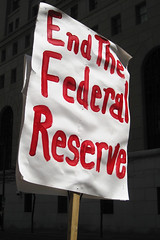| End the Federal Reserve (Photo credit: r0b0r0b) |
By JON HILSENRATH, KRISTINA PETERSON, MICHAEL S. DERBY and ERIC MORATH
Washington, Jan.19, stock investing .- Fed officials in 2007 seemed to underestimate risks in the financial system before shifting to a state of alarm, according to newly released transcripts from the central bank's meetings that year. The transcripts, which are released with a five-year lag, provide the most complete view of decision making inside the nation's central bank at a time of historic crisis. That year proved to be a pivotal one as the crisis built and Washington began its move toward an aggressive intervention, which bore full fruit in 2008.
The Fed entered 2007 with interest-rate policies on hold and many officials comfortable about the economic outlook. By year-end, the U.S. was in recession and the Fed had begun an increasingly panicked campaign to cut interest rates and launch new programs to cushion financial markets from building dysfunction.
Fed Chairman Ben Bernanke often sought to stake out a middle ground as debates raged at the Fed about how to proceed. Early on he was often behind the curve in his economic outlook. In January, for example, he projected that the "worst outcomes" for housing had become less likely. In May, he said he saw "good fundamental reasons to think that growth will be moderate."
He began to see after midyear that strains in financial markets threatened to move beyond housing to the broader economy and financial system. Mr. Bernanke himself slowly took on a more interventionist stance, but appears to have embraced that position reluctantly.
In December, when the U.S. had already moved into recession, the Fed was considering a large, half-percentage point reduction in its benchmark interest rate to soften the blow of growing financial dislocation on the economy. Mr. Bernanke said he was sympathetic, but chose a modest path—a quarter percentage point reduction. He confided to his colleagues, "You can tell that I am quite conflicted about it."
The transcripts show some haunting declarations by Mr. Bernanke and others. In September 2007, the Fed had already taken steps to provide cheaper credit to banks. Mr. Bernanke declared to his colleagues:
"As the central bank we have a responsibility to help markets function normally and to promote economic stability, broadly speaking. We are not in the business of bailing out individuals or businesses." The coming months would be marked by Fed-funded bailouts of Bear Stearns and American International Group .
Then-New York Fed President Timothy Geithner, who would later became President Barack Obama's Treasury secretary, played down problems at two hedge funds controlled by Bear, which in retrospect were a turning point in the crisis. "Direct exposure of the counterparties to Bear Stearns is very, very small compared with other things," he said.
Meanwhile, Janet Yellen, then president of the Federal Reserve Bank of San Francisco and now the central bank's vice chairman, became increasingly alarmed about the growing risks to the economy as the year progressed.
"I still feel the presence of a 600-pound gorilla in the room, and that is the housing sector," she said in June 2007. "The risk for further significant deterioration in the housing market, with house prices falling and mortgage delinquencies rising further, causes me appreciable angst."
By December, she was pushing the Fed for aggressive responses to the crisis. "At the time of our last meeting, I held out hope that the financial turmoil would gradually ebb and the economy might escape without serious damage. Subsequent developments have severely shaken that belief," she said in December.
Ms. Yellen, who is a potential candidate to succeed Mr. Bernanke when his term ends in January 2014, favored an aggressive half percentage point interest-rate cut to cushion the blow.
Boston Fed President Eric Rosengren and Dallas Fed president Richard Fisher also issued some early warnings about the building crisis.....

No comments:
Post a Comment